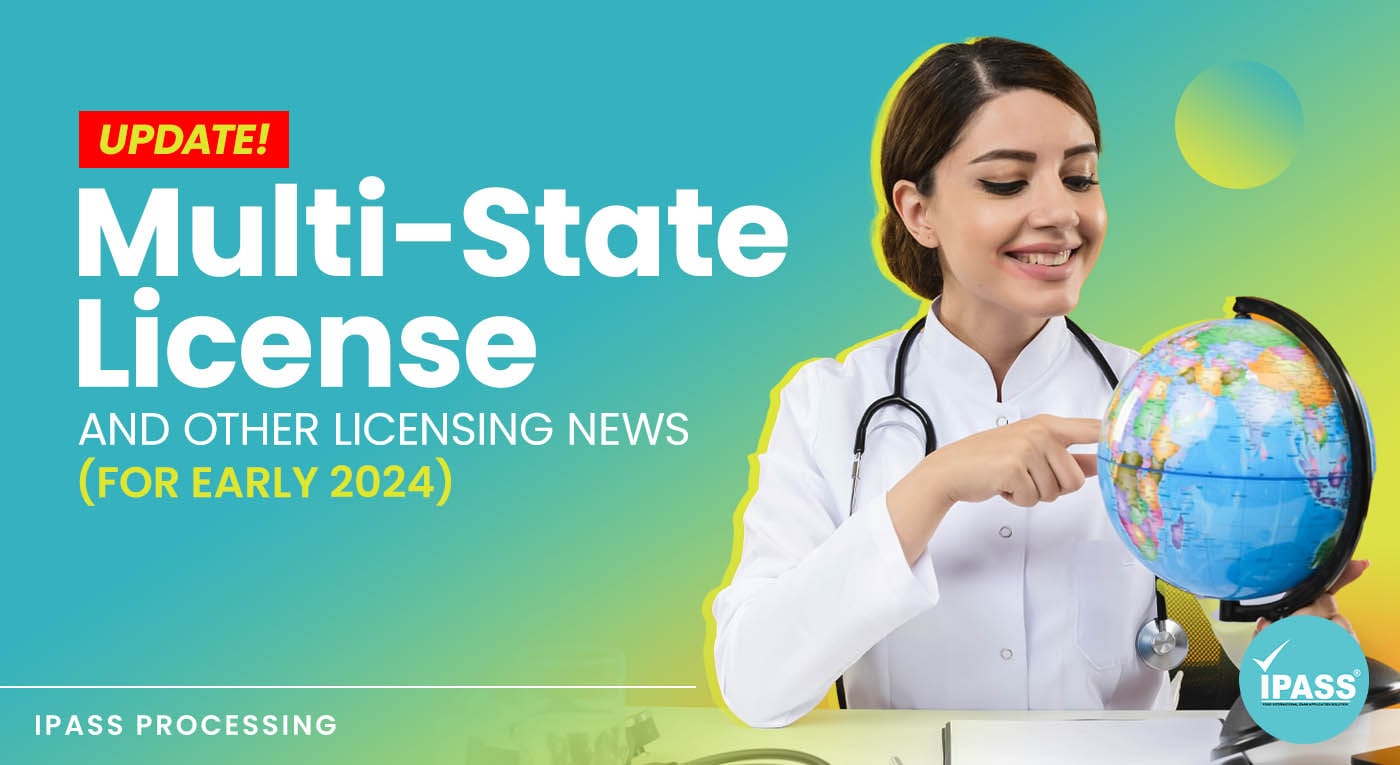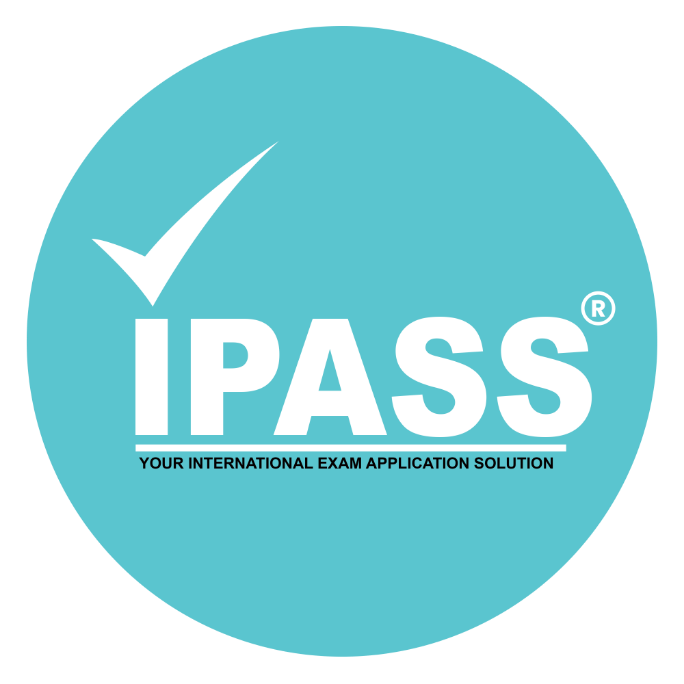Your cart is currently empty!

Discover the Latest Nurse Licensing News and Updates 2024
(Estimated Reading Time: 8 minutes)
Keeping up with changes in international healthcare licensing can be challenging due to the frequent updates. To help you stay informed, we’ve gathered the latest healthcare and nurse licensing news and updates for early 2024. Let’s start with the Nursing Licensure Compact rule update:
60-Day Grace Period for Nursing Compact State Licenses
Starting January 2, 2024, there’s significant licensing news regarding the multi-state licensed nurses (NLC nurses). It’s the 60-day grace period to make it easier for nurses moving between states in the Nurse Licensure Compact (NLC). Moreover, this tweak tackles past hurdles relocating nurses face and gives them more flexibility.
Before January 2nd, 2024
Before the revision, nurses transitioning between participating states within the NLC were required to notify the new state of residency immediately. In addition, they need to initiate the licensure process as soon as possible. Hence, it often led to stress and administrative hurdles, particularly for nurses on tight timelines or unexpected relocations.
After January 2nd, 2024
Nurses with a compact state license now have a 60-day grace period. Thus, nurses must notify the new state of residency and apply for a license by endorsement within the grace period. Moreover, this simple modification carries significant weight, offering nurses newfound flexibility and simplifying the transition process. So, delve deeper into the rule’s key aspects and importance and explore its potential influence on nurses and healthcare systems.
Importance of the Multi-state Licensing Update
During the grace period, nurses have ample time to complete administrative tasks and collect necessary documentation without feeling rushed. Moreover, this nurse licensing update allows them to adjust to their new environment without the added pressure of taking immediate action. In addition, the rule’s significance lies in its potential to positively impact both nurses and healthcare systems:
For Nurses
a. Reduced Stress and Anxiety: The 60-day grace period alleviates the pressure of immediate licensure, allowing nurses to focus on settling into their new environment first. Thus, it lessens stress and anxiety, ultimately fostering better well-being and job satisfaction.
b. Smoother Transition: The extended grace period facilitates a more seamless transition between states. So, it allows nurses to focus on finding new employment opportunities without the additional licensing worries. Moreover, it can lead to quicker integration into the local healthcare system and increased job security.
c. Ensures Compliance: Clarifies the timeline for nurses to obtain proper licensure in their new residence, promoting patient safety and regulatory compliance.
For Healthcare Systems
a. Increased Workforce Mobility: The revised rule incentivizes nurses to relocate to other nursing compact states, expanding the potential talent pool for healthcare institutions. Thus, it can be particularly beneficial in regions experiencing nurse shortages.
b. Reduced Administrative Burden: The simplified licensing processes, aided by the 60-day window, speed up nurse onboarding, saving time and resources for healthcare institutions.
c. Improved Patient Access to Care: Faster integration of licensed nurses translates to quicker availability of skilled healthcare professionals, ultimately improving access to essential care services.
Addressing Potential Concerns
While the multi-state nurse licensing news and updates hold significant potential, it’s also crucial to acknowledge the potential concerns.
a. Compliance Remains Crucial: While the grace period provides flexibility, nurses must adhere to the 60-day timeframe to avoid delays or complications. So, remaining informed and proactive is essential.
b. State-Specific Variations: Certain states may have additional requirements or nuances within their endorsement process. Hence, nurses relocating should thoroughly research specific requirements to ensure a smoother transition.
Why do nurses get multi-state licenses?
Nurses get multi-state licenses, also known as compact licenses, for several reasons:
a. Increased job flexibility: With a multi-state license, nurses can take travel nursing assignments in different states without obtaining a new license. Additionally, it can be desirable to nurses who wish to reside or work in various locations. Also, this nurse licensing news and updates can help nurses who want to be able to respond to disasters or other emergencies.
b. Reduced costs and paperwork: Obtaining and maintaining multiple single-state licenses can be expensive and time-consuming. So, a multi-state license eliminates the need to go through this process in each state where the nurse wants to practice.
c. Faster disaster response: Nurses often travel to affected areas to provide care during disasters or other emergencies. Multi-state licenses can expedite this process by eliminating the need for nurses to obtain new licenses in each state.
d. Improved access to care: Multi-state licenses can help to improve access to care in underserved areas by making it easier for nurses to practice there.
It is important to note that not all nurses are eligible for multi-state licenses. Nurses must meet the requirements of the NLC to practice in all member states with a single license. Furthermore, as of October 2023, 41 jurisdictions have enacted NLC legislation or have pending legislation. So, staying updated about the Nursing Licensing Compact and other nursing licensing news and updates is best.
Other Notable Nurse Licensing News and Updates
Alongside the NLC rule revision, additional critical nurse licensing news and updates in early 2024 include:
Update on CGFNS Fees
Effective January 1, 2024, CGFNS instituted across-the-board fee increases ranging from $25 to $100 depending on the specific service. In addition, the essential services and associated price changes are:
Credential Evaluation Services
a. CES Application Report: $485 ($35 increase)
b. Expedited Review Service: $425 ($25 increase)
c. Re-Evaluation: $290 ($15 increase)
d. Reprocess Expired Application: $225 ($25 increase)
English Language Proficiency
a. Report Fee (per report): $125 ($25 increase)
eDAS – Document Authentication
a. Service Report (d1 recipient): $275 ($10 increase)
b. Additional Recipients: $125 per recipient
VisaScreen Services
a. VisaScreen Application: $740 ($40 increase)
b. Expedited Review: $650 ($50 increase)
c. Renewal Application: $475 ($25 increase)
d. Reprocess Expired Application: $250 ($25 increase)
e. Replacement Certification: $195 ($20 increase)
f. Certificate Verification Letter: $150 ($25 increase)
Certification Program Services
a. Certification Application: $495 ($20 increase)
b. Re-Examination Application: $250 ($25 increase)
c. Program Evaluation: $395
d. Testing Window Change Fee: $50
e. Replacement Certificate: $175 ($25 increase)
f. Certificate Verification Letter: $125
The updated fee will cover the rising costs across CGFNS credentialing and visa screening services.
Visa Screen Certificates
Around mid-December 2023, clients may view the digital copies of their certificates. Moreover, starting January 2025, the issuance of physical certificates will be phased out. This transition is anticipated to simplify the process of certificate corrections significantly.
The Digital Copy remains valid and downloadable for five (5) years. During these five (5) years, if an applicant requires an additional copy, they can download it again. Furthermore, they can print digital copies of VS certificates (colored), which can be presented to the embassy.
PRC Updates
For our local nursing licensing news and updates, the PRC now requires nurses to submit a Continuing Professional Development (CPD) certificate. In addition, nurses must earn at least 15 CPD units to renew their Philippines nursing license. However, overseas Filipino nurses are exempted from this requirement but must provide other proof of overseas work status. Moreover, nurses can check the PRC website for information on CPD providers offering qualifying seminars and workshops.
Overseas Filipino Professionals (OFPs), instead of CPD certificates, shall submit any of the following:
a. Overseas Employment Certificates (OEC) from the Philippine Overseas Employment Administration (POEA);
b. Passport and working visa or permit (in a foreign country);
c. Contract of Service or Employment Overseas;
d. Company Identification Card (foreign company);
e. Residence permit/permit to stay in a foreign country; or
f. Other credible proof/s of identity or status as OFP
The PRC also extended the acceptance of the CPD undertaking for renewing Professional Identification Cards (PIC) until December 31, 2024. Furthermore, it offers our healthcare professionals more time for compliance.
VISA Retrogression Updates
The March 2024 visa bulletin shows forward movement in priority dates for employment-based green card applicants in the Philippines. Moreover, nurses from the Philippines with priority dates earlier than September 8, 2022, are eligible for final green card approval.
New Recommended US States for Licensure
Amidst the latest nurse licensing news and updates, IPASS recommends two (2) new states: Michigan and Montana. Both states offer cost-effective licensing fees and relatively more straightforward application processes than others. Moreover, they exhibit a notable demand for nurses, particularly in rural and underserved regions.
Michigan
a. Fingerprinting is required
b. Credential Evaluation is required
c. Requires PRC good standing
d. CEUs required
e. The processing timeframe for the whole application is approximately 6-7 months
f. The application is valid for two (2) years
Montana
a. Member of NLC
b. Credential Evaluation is required
c. Fingerprinting is required
d. The processing timeframe for the whole application is approximately 6-7 months
e. The application is valid for a year
Summing-it Up
There are many significant changes in international healthcare licensing in the first quarter of 2024, particularly the revised NLC rule. These nurse licensing news and updates present opportunities and challenges for international nurses seeking to practice in the USA, Canada, Australia, and the Middle East.
Staying informed about these changes is crucial for navigating the complex international and domestic nurse licensing world. Moreover, nurses can ensure a successful journey toward their career goals by understanding the latest licensing news and seeking professional guidance.
Ready to take the next step on your nursing career journey?
IPASS Processing can help you navigate the complexities of international nurse licensing in the USA, Canada, Australia, and the Middle East. Our experienced team and streamlined processes will ensure a smooth and efficient licensing experience.
Contact us today for a free assessment!
Recommended Reads
- Pass the NCLEX with Confidence – Join IPASS NCLEX Review 18th Cycle
- NCLEX Pass Rates 2024: Key Insights You Need to Know
- May 2025 PNLE Results: Top Schools & Topnotchers
- Ace the May 2025 PNLE: Final Week Preparation Tips
- Nursing Job Opportunities in the Philippines for USRNs
Recommended Topics
- ASCPi (1)
- Australia (8)
- Canada (5)
- Exam Tips (28)
- General (120)
- IPASS Events (10)
- IPASS News (129)
- Middle East Nursing (17)
- NCLEX (65)
- New Zealand (3)
- NMBI Ireland (1)
- Online Review (13)
- PNLE Online Review (3)
- Tourist Visa (1)
- UKNMC (1)
- US Nursing (12)
- UWorld (1)
- VisaScreen (3)








Leave a Reply